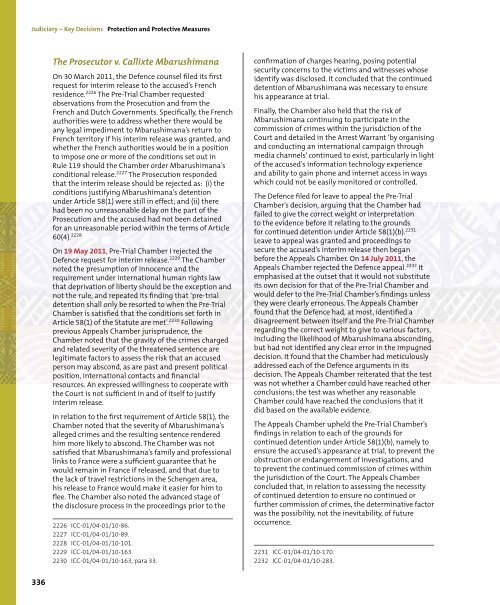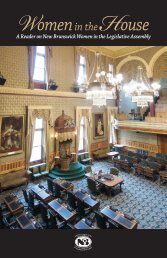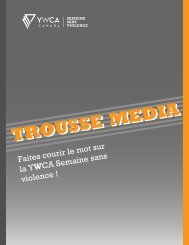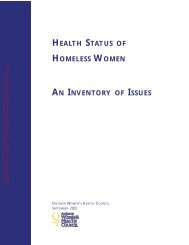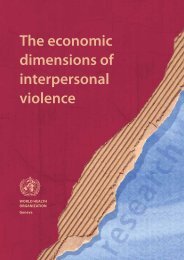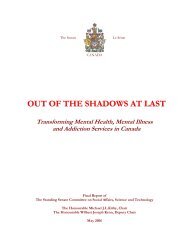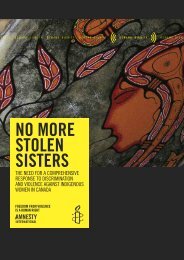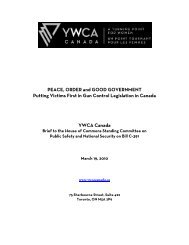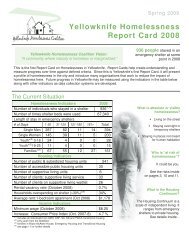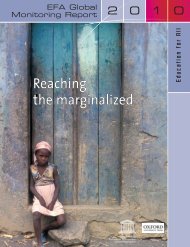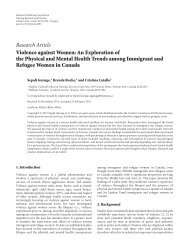Gender Report Card on the International Criminal ... - YWCA Canada
Gender Report Card on the International Criminal ... - YWCA Canada
Gender Report Card on the International Criminal ... - YWCA Canada
You also want an ePaper? Increase the reach of your titles
YUMPU automatically turns print PDFs into web optimized ePapers that Google loves.
Judiciary – Key Decisi<strong>on</strong>s Protecti<strong>on</strong> and Protective Measures<br />
The Prosecutor v. Callixte Mbarushimana<br />
On 30 March 2011, <strong>the</strong> Defence counsel filed its first<br />
request for interim release to <strong>the</strong> accused’s French<br />
residence. 2226 The Pre-Trial Chamber requested<br />
observati<strong>on</strong>s from <strong>the</strong> Prosecuti<strong>on</strong> and from <strong>the</strong><br />
French and Dutch Governments. Specifically, <strong>the</strong> French<br />
authorities were to address whe<strong>the</strong>r <strong>the</strong>re would be<br />
any legal impediment to Mbarushimana’s return to<br />
French territory if his interim release was granted, and<br />
whe<strong>the</strong>r <strong>the</strong> French authorities would be in a positi<strong>on</strong><br />
to impose <strong>on</strong>e or more of <strong>the</strong> c<strong>on</strong>diti<strong>on</strong>s set out in<br />
Rule 119 should <strong>the</strong> Chamber order Mbarushimana’s<br />
c<strong>on</strong>diti<strong>on</strong>al release. 2227 The Prosecuti<strong>on</strong> resp<strong>on</strong>ded<br />
that <strong>the</strong> interim release should be rejected as: (i) <strong>the</strong><br />
c<strong>on</strong>diti<strong>on</strong>s justifying Mbarushimana’s detenti<strong>on</strong><br />
under Article 58(1) were still in effect; and (ii) <strong>the</strong>re<br />
had been no unreas<strong>on</strong>able delay <strong>on</strong> <strong>the</strong> part of <strong>the</strong><br />
Prosecuti<strong>on</strong> and <strong>the</strong> accused had not been detained<br />
for an unreas<strong>on</strong>able period within <strong>the</strong> terms of Article<br />
60(4). 2228<br />
On 19 May 2011, Pre-Trial Chamber I rejected <strong>the</strong><br />
Defence request for interim release. 2229 The Chamber<br />
noted <strong>the</strong> presumpti<strong>on</strong> of innocence and <strong>the</strong><br />
requirement under internati<strong>on</strong>al human rights law<br />
that deprivati<strong>on</strong> of liberty should be <strong>the</strong> excepti<strong>on</strong> and<br />
not <strong>the</strong> rule, and repeated its finding that ‘pre-trial<br />
detenti<strong>on</strong> shall <strong>on</strong>ly be resorted to when <strong>the</strong> Pre-Trial<br />
Chamber is satisfied that <strong>the</strong> c<strong>on</strong>diti<strong>on</strong>s set forth in<br />
Article 58(1) of <strong>the</strong> Statute are met’. 2230 Following<br />
previous Appeals Chamber jurisprudence, <strong>the</strong><br />
Chamber noted that <strong>the</strong> gravity of <strong>the</strong> crimes charged<br />
and related severity of <strong>the</strong> threatened sentence are<br />
legitimate factors to assess <strong>the</strong> risk that an accused<br />
pers<strong>on</strong> may absc<strong>on</strong>d, as are past and present political<br />
positi<strong>on</strong>, internati<strong>on</strong>al c<strong>on</strong>tacts and financial<br />
resources. An expressed willingness to cooperate with<br />
<strong>the</strong> Court is not sufficient in and of itself to justify<br />
interim release.<br />
In relati<strong>on</strong> to <strong>the</strong> first requirement of Article 58(1), <strong>the</strong><br />
Chamber noted that <strong>the</strong> severity of Mbarushimana’s<br />
alleged crimes and <strong>the</strong> resulting sentence rendered<br />
him more likely to absc<strong>on</strong>d. The Chamber was not<br />
satisfied that Mbarushimana’s family and professi<strong>on</strong>al<br />
links to France were a sufficient guarantee that he<br />
would remain in France if released, and that due to<br />
<strong>the</strong> lack of travel restricti<strong>on</strong>s in <strong>the</strong> Schengen area,<br />
his release to France would make it easier for him to<br />
flee. The Chamber also noted <strong>the</strong> advanced stage of<br />
<strong>the</strong> disclosure process in <strong>the</strong> proceedings prior to <strong>the</strong><br />
2226 ICC-01/04-01/10-86.<br />
2227 ICC-01/04-01/10-89.<br />
2228 ICC-01/04-01/10-101.<br />
2229 ICC-01/04-01/10-163.<br />
2230 ICC-01/04-01/10-163, para 33.<br />
c<strong>on</strong>firmati<strong>on</strong> of charges hearing, posing potential<br />
security c<strong>on</strong>cerns to <strong>the</strong> victims and witnesses whose<br />
identify was disclosed. It c<strong>on</strong>cluded that <strong>the</strong> c<strong>on</strong>tinued<br />
detenti<strong>on</strong> of Mbarushimana was necessary to ensure<br />
his appearance at trial.<br />
Finally, <strong>the</strong> Chamber also held that <strong>the</strong> risk of<br />
Mbarushimana c<strong>on</strong>tinuing to participate in <strong>the</strong><br />
commissi<strong>on</strong> of crimes within <strong>the</strong> jurisdicti<strong>on</strong> of <strong>the</strong><br />
Court and detailed in <strong>the</strong> Arrest Warrant ‘by organising<br />
and c<strong>on</strong>ducting an internati<strong>on</strong>al campaign through<br />
media channels’ c<strong>on</strong>tinued to exist, particularly in light<br />
of <strong>the</strong> accused’s informati<strong>on</strong> technology experience<br />
and ability to gain ph<strong>on</strong>e and internet access in ways<br />
which could not be easily m<strong>on</strong>itored or c<strong>on</strong>trolled.<br />
The Defence filed for leave to appeal <strong>the</strong> Pre-Trial<br />
Chamber’s decisi<strong>on</strong>, arguing that <strong>the</strong> Chamber had<br />
failed to give <strong>the</strong> correct weight or interpretati<strong>on</strong><br />
to <strong>the</strong> evidence before it relating to <strong>the</strong> grounds<br />
for c<strong>on</strong>tinued detenti<strong>on</strong> under Article 58(1)(b). 2231<br />
Leave to appeal was granted and proceedings to<br />
secure <strong>the</strong> accused’s interim release <strong>the</strong>n began<br />
before <strong>the</strong> Appeals Chamber. On 14 July 2011, <strong>the</strong><br />
Appeals Chamber rejected <strong>the</strong> Defence appeal. 2232 It<br />
emphasised at <strong>the</strong> outset that it would not substitute<br />
its own decisi<strong>on</strong> for that of <strong>the</strong> Pre-Trial Chamber and<br />
would defer to <strong>the</strong> Pre-Trial Chamber’s findings unless<br />
<strong>the</strong>y were clearly err<strong>on</strong>eous. The Appeals Chamber<br />
found that <strong>the</strong> Defence had, at most, identified a<br />
disagreement between itself and <strong>the</strong> Pre-Trial Chamber<br />
regarding <strong>the</strong> correct weight to give to various factors,<br />
including <strong>the</strong> likelihood of Mbarushimana absc<strong>on</strong>ding,<br />
but had not identified any clear error in <strong>the</strong> impugned<br />
decisi<strong>on</strong>. It found that <strong>the</strong> Chamber had meticulously<br />
addressed each of <strong>the</strong> Defence arguments in its<br />
decisi<strong>on</strong>. The Appeals Chamber reiterated that <strong>the</strong> test<br />
was not whe<strong>the</strong>r a Chamber could have reached o<strong>the</strong>r<br />
c<strong>on</strong>clusi<strong>on</strong>s; <strong>the</strong> test was whe<strong>the</strong>r any reas<strong>on</strong>able<br />
Chamber could have reached <strong>the</strong> c<strong>on</strong>clusi<strong>on</strong>s that it<br />
did based <strong>on</strong> <strong>the</strong> available evidence.<br />
The Appeals Chamber upheld <strong>the</strong> Pre-Trial Chamber’s<br />
findings in relati<strong>on</strong> to each of <strong>the</strong> grounds for<br />
c<strong>on</strong>tinued detenti<strong>on</strong> under Article 58(1)(b), namely to<br />
ensure <strong>the</strong> accused’s appearance at trial, to prevent <strong>the</strong><br />
obstructi<strong>on</strong> or endangerment of investigati<strong>on</strong>s, and<br />
to prevent <strong>the</strong> c<strong>on</strong>tinued commissi<strong>on</strong> of crimes within<br />
<strong>the</strong> jurisdicti<strong>on</strong> of <strong>the</strong> Court. The Appeals Chamber<br />
c<strong>on</strong>cluded that, in relati<strong>on</strong> to assessing <strong>the</strong> necessity<br />
of c<strong>on</strong>tinued detenti<strong>on</strong> to ensure no c<strong>on</strong>tinued or<br />
fur<strong>the</strong>r commissi<strong>on</strong> of crimes, <strong>the</strong> determinative factor<br />
was <strong>the</strong> possibility, not <strong>the</strong> inevitability, of future<br />
occurrence.<br />
2231 ICC-01/04-01/10-170.<br />
2232 ICC-01/04-01/10-283.<br />
336


